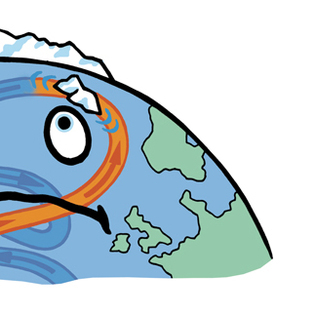 loading
loading
FindingsFlow stateWhat happens if the most important Atlantic current stops running?  Gregory NemecView full imageGloomy climate forecasts, from rising seas and extreme weather to extinctions, just got a little bit gloomier. An article published this January in Science Advances speculates that unless carbon dioxide emissions are reined in, a major current in the Atlantic Ocean—a current crucial to climate stability—could collapse. The Atlantic Meridional Overturning Circulation, or AMOC, shuttles warm water from the tropics to the Arctic Ocean in a surface current; then, in a deeper stream, it returns cold water south. Observations have shown this process slowing in recent decades (primarily due to surface warming and decreased salinity). But the vast majority of climate models predict that that process will eventually stabilize, leaving the current moderately weakened. Wei Liu, a postdoc in Yale’s Department of Geology and Geophysics, says this view may misrepresent the future. Running a new model that rests on different but reasonable assumptions about freshwater flow into the Atlantic, Liu and his coauthors demonstrate the eventual collapse of the AMOC. The process takes quite some time—the current stalls 300 years after atmospheric carbon dioxide doubles from 1990 levels—but the consequences are striking. Winter temperatures in Greenland and Iceland drop by as much as nine degrees centigrade. (The AMOC is what keeps the region so temperate for its latitude.) Sea ice expands in the Arctic while retreating around the Antarctic. Rainfall increases in the southern tropics and Brazil, but decreases in the northern tropics and Central America. The collapse and its sweeping effects would be a tipping point in the climate system. Liu’s model has its quirks: for example, he has carbon dioxide levels doubling instantaneously rather than slowly. But the experiment serves as an exploratory probe, he says: “In this case, we did a simple scenario, but we plan to do further work.”
The comment period has expired.
|
|